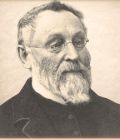Leucorrhoea: profuse, flows like the menses, and has the same odour (C.).
May be used in spasmodic diseases, even in convulsions. When walking in the open air, the patient falls but soon recovers. During the unconscious stage, he passes urine. These attacks especially recur at the new moon (F.).
May be called for in colic after failure of Colocynth. The pains are of a griping, cutting character and are relieved by bending double (F.).
AGGRAVATION:
In the evening; in the open air; after drinking coffee; while perspiring; in clear, fine weather; during new moon; from getting wet or bathing; and from coming from the air into a warm room.
AMELIORATION:
From warmth; in damp, wet weather.
RELATIONSHIP:
complementary: Carbo vegetabilis, Petrosel.
INCOMPATIBLE: Phosphorus Must not be used before or after Phosphorus, always disagrees; the Acids; Coffea.

